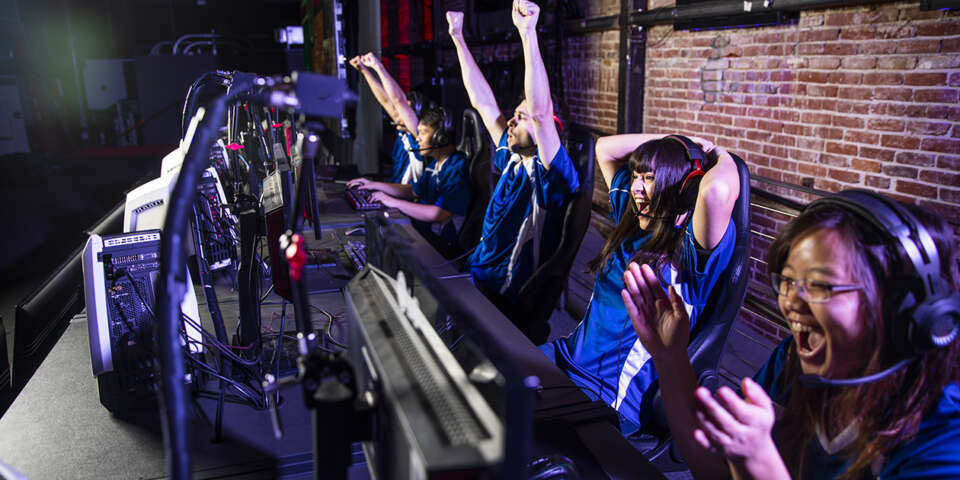WLA members have been slow to embrace esports but it is the fastest growing category in sports betting.
Market research analyst Newzoo predicts global esports revenue from sponsorship, media rights and more to top USD 1 billion during 2019. More interesting still, betting on esports could reap USD 13 billion by 2020, according to gambling research firm Eilers & Krejcik. The opportunity is vast.
“It is the fastest growing sports betting product in the world by a mile,” says Ian Smith, the integrity commissioner of the Esports Integrity Coalition (ESIC).
Thus far, only a handful of lotteries have entered the fray. Danish lottery operator Danske Spil was the first to accept bets on esports in 2014, shortly followed by Veikkaus in Finland. Their neighbours in Norway and Sweden followed. But further afield, only France’s Française des Jeux (FDJ), Hrvatska Lutrija (the Croatia National Lottery) and Canada’s British Columbia Lottery Corporation (BCLC) have followed suit.
Danske Spil was the first lottery and Denmark’s first betting operator to accept bets on esports. The lottery’s brand manager for esports and poker Rasmus Simonsen says: “We were aware that it was uncharted territory and that we had to be aware of match fixing and game integrity as well as pricing correctly. However, we kept betting limits low, and we had a very hands-on approach. This way we could learn along the way, and also make sure we didn’t see any suspect play.”
Danske Spil’s esports business was an instant success. It grew 481% from 2014-16 and has grown 324% from 2016-2018.
Veikkaus was similarly pleased by the reaction of its customers when it launched its esports business later the same year.
In its first month, the lottery attracted 1,000 new customers whose first bet was on esports. Customer feedback was largely positive, says Veikkaus product development specialist Jani Karjalainen, although some customers said "it's about time, welcome to the 2010s!"
Annual revenue tripled during the first three years but has evened out since. However, esports is Veikkaus’s fifth biggest sport in fixed odds betting and fourth biggest sport in live betting. It accounts for 3% of all fixed odds bets and 7% of Veikkaus’s live betting.
For BCLC, esports is smaller – less than 1% of revenue – but it is growing and it gives the lottery access to a different demographic. And, most importantly, it stops those customers from betting elsewhere.
For Karjalainen and the others, esports is just another sports betting event. Of course, not all lotteries operate sportsbooks but for those doing so, esports would seem an obvious option.
However, the first issue is one of perception. You do not bet on esports like you bet on football or basketball, you bet on League of Legends or Counterstrike. And within those games, you have leagues and tournaments such as CS:GO or ESL One, much like you might bet on the English Premier League or the UEFA Champions League.
BCLC director of eGaming and digital experience Cameron Adams says: “It is a bit unfortunate the industry chose that term [esports], because it is mislabelled. It is as broad and diverse as the term sports betting.”
Assessing the risks
While Smith is keen to encourage lotteries’ involvement he also urges caution. Esports is not organised in a manner familiar to those working with more established sports.
“There are no governing bodies in a traditional sense,” says Smith.
The only national association that licences events and could be considered an equivalent of The FA or UEFA would be the Korea e-Sports Association (KeSPA), which has government backing. Very recently, the German association, which has a wide membership across tournament organisers, publishers and other stakeholders, also started running tournaments under its own name.
“That is very rare. Most national governing bodies in esports are an utter irrelevance,” says Smith.
Esports is a professional, commercial industry but it is run by the publishers that own the games.
For example, the company Blizzard owns World of Warcraft, Hearthstone and Overwatch, and runs the esports tournaments for those games. These can be considered tier one esports with millions of followers and a huge ecosystem worth millions of dollars. At the other end of the scale you have something like Tekken 5 with a few hundred thousand fans, limited prize money and a small professional scene.
Lotteries tend to be far more cautious than many esports-only bookmakers, which can be fairly reckless with the events they accept bets on. But regular mainstream bookmakers such as Betway and Sky Betting & Gaming, which have also been involved in esports for a while, are also quite cautious.
In terms of their appetite for risk, these private sector operators are a world away from the likes of GGBet or 1XBet, which are primarily Eastern European or Asian-facing operators offering markets on almost anything that looks like an esports contest.
“Offering betting markets on esports requires significant expertise on the game and the statistics around the game,” says Smith.
Danske Spil has an experienced team of six people, which includes full-time traders, marketing and product specialists. It also works with external feed providers to complement the work of its own traders.
Smith would advise any lottery thinking of entering the fray to buy its data from a Sportradar, an Ultraplay, a BetGenius or another operator like Pinnacle or Paddy Power, rather than recruiting a trader. BCLC, for example, takes its odds from Paddy Power, which provides the lottery with a complete sports betting package, within which esports is just one of several sports.
“They will provide an integrity overlay,” says Smith. “You can offer that market with a fair degree of assurance that it is a safe market that will not be manipulated.”
“There is no need for lotteries to take big risks on tier three, four or five tournaments,” he continues. “They can dip their toes in. They are not under the same pressure as a start-up esports online operator. They can be a lot more cautious.”
The ESL One series of tournaments is a good example of a multi-million dollar contest with top-level teams playing in a professional manner. ESL is an ESIC member and ESIC carries out anti-doping tests at ESL’s tournaments. The anti-corruption code applies and betting patterns are monitored by ESIC.
“It is the equivalent of a football team fixing a World Cup match. It is not inconceivable but it is highly unlikely,” says Smith. Simonsen says all major leagues have clear rules and regulations, on everything from playing with substitutes, delays between games, choosing maps or champions, and penalties for breaking any rules. Some of them also work close with ESIC, which in turn works with the Global Lottery Monitoring System (GLMS).
“We do offer games on smaller tournaments, but as a rule of thumb we require the above mentioned to be in place,” he continues. “Also all games have to be available for scrutiny. Are the league and games covered by news sites? (HLTV.org, for example). And can you watch the matches live? There are a number of tournament that do not live up to these conditions, and we do not offer betting on these.”
According to Smith, the biggest problem for esports integrity is the game Dota2. “It is completely out of control. The fixing is rife,” says Smith.
The number of suspicious betting alerts on Dota2 games doubled in 2018 and Smith says the 2019 figures suggest that number will be eclipsed by the end of the year. So why is Dota2 so prone to corruption?
“It’s popular in China,” says Smith bluntly. “If you want to reduce things to the simplest possible factor, it is always about China. If you get a raft of fixing in any game you can guarantee it comes from China. It’s because of the sheer volume of liquidity in the Chinese market and their experience in match-fixing. Games that are popular in China will always, always, always have issues with fixing.”
The integrity commissioner estimates that Chinese betting drives at least 50 per cent of all match-fixing activity in any sport. He thinks the actual number might be nearer 80 per cent.
China is not Smith’s most pressing concern though. His biggest frustration is engaging publishers, who do not view match integrity as their problem. Valve Corporation, for example, does not run esports competitions like other publishers do.
Valve has a company philosophy that it is a software development house and not an esports company or an event organiser. It licenses Dota2 to other companies and does not consider integrity to be its responsibility.
“I have to deal with a myriad of small organisers, who are putting on online Dota2 tournaments that people are putting pretty extensive markets on, and these are being fixed,” states Smith.
“Outside of the majors and the really top level competition, I wouldn’t offer Dota2 as a game. I wouldn’t offer Warcraft 3 if my life depended on it. It’s almost inevitably fixed. You just have to be careful and take advice but you should definitely get involved.”
Neither Danske Spil nor Veikkaus exclude specific games but both think very carefully about which tournaments and games to accept bets on.
“For example Fortnite isn't ready for it yet, because the game's internal anti-cheat is not working well enough,” says Karjalainen. “Just like any other sport, we carefully consider which tournaments and leagues we will qualify for betting (region, prize pool, participants, etc.). Then we set risk limits based on that data. When the events are playable, we do normal in-house risk management with the support of GLMS and Sportradar.”
Simonsen says Danske Spil also tests the “relevance” of tournaments for its market.
“For example, some of the South East Asia tournaments have little relevance for us, and since we also have less knowledge about these markets we often opt to remove the smaller tournaments from our offering.”
Doing your homework
Smith says that Counterstrike, Dota2, League of Legends and Overwatch account for about 90 per cent of the esports betting market. This means three companies - Blizzard, Riot Games and Valve - have a massive hold on the market.
“These publishers are all based on the West Coast of America and they all have an antipathy towards betting on their games. Being in America, they have no background in sports betting because until recently it has been wholly illegal – often considered immoral. They have zero understanding of sports betting, zero understanding of its impact on competitive integrity and zero understanding of how to commercialise or control it. They just didn’t like it.”
The publishers have started to accept that there will be a huge amount of people betting on their games and that the number will only increase as Americans become more accustomed to regulated sports betting.
“It is a good market to be in,” says Smith. “From an integrity point of view it is essential that more and more well regulated operators get involved and we shine more light into the dark corners. I want more state lotteries to be offering esports markets because that will attract a safer betting environment and draw away from illegal and invisible markets that are largely responsible for the problems in esports fixing.”
But all of the operators advise potential new arrivals to do their homework. First, says Karjalainen, it is esports – not eSports or e-sports – and only Esports at the beginning of a sentence.
“The esports scene knows its dignity,” he says, “and they will know if you're not fully involved. So if you do something with esports do your research and planning properly.”
The last thing you want to do is come across like an out-of-date grandparent gate-crashing the kids’ rave.
Simonsen echoes this point: “How do you offer new markets if you do not know what ‘under/over kills’ or ‘number of aces’ means. For marketing and communication, you also need to know the difference between CS:GO and LoL, and the difference between a noob and a troll. If not, you will not resonate with the consumer base and they will find other places to do their business.”
“So if you do something with esports do your research and planning properly. It’s always wise to ask for help from the local esports scene (teams, players, fans, experts etc.) as much as you can. They will appreciate it,” says Karjalainen. “And finally, if you're not yet involved, what are you waiting for? If you go with it properly, it will be a great journey and you will not regret it.”










